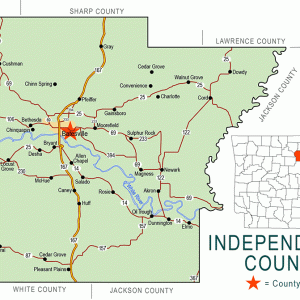calsfoundation@cals.org
Denieville (Independence County)
The historic community of Denieville was located on Spring Creek less than a mile from Limedale (Independence County) on Limedale Road. It was about five miles west-northwest of the county seat, Batesville (Independence County). The White River and the Missouri Pacific railroad tracks run about two miles south of Denieville.
Following the Civil War, mining interests in the eastern United States attempted to develop the white lime deposits of Independence County for commercial use, establishing kilns near Batesville. (Quick lime is used for a number of purposes, including mortar, plaster, and the manufacture of paper.) The production of lime in Independence County began in earnest in 1887, emerging on a small scale at Denieville on the Cushman (Independence County) branch of the St. Louis, Iron Mountain and Southern Railroad that same year. Milton Ralph Denie built a lime kiln on Spring Creek and found markets in the southern and eastern United States.
From 1888 until 1904, Denieville had a post office located in a general store for the lime workers. John Hastings was appointed first postmaster, but the lime plant owner, Milton Ralph Denie, took over the next year and served as postmaster until his death in 1901. A new post office opened at Leiper (Independence County) in 1904 for the lime workers, but it closed in 1907.
Milton R. Denie was the son of lime dealer John A. Denie—who was born in New York but spent most of his life in Memphis, Tennessee—and Mary Walker Denie from Kentucky. Denie lived in Memphis most of his life but moved to Little Rock (Pulaski County) around 1887, where he engaged in the mercantile business and began his lime operations in Independence County. Denie worked with his father in the lime business before opening his own lime kiln in Denieville and establishing a residence in Ruddell Hill (Independence County). He was visiting his physician in Memphis when he died suddenly of heart failure in May 1901 at age forty-one. Denie’s kiln superintendent, Edgar Monroe Young, took over operations. The lime plant in Denieville closed in 1904.
Young married a daughter of William Byers Ruddell of the pioneering family of the area. When the kiln at Denieville ceased operation, Young continued as superintendent at the kiln of G. A. Armstrong Leiper and Sons at Leiper about a mile east of Earnheart (Independence County) on the Iron Mountain line. G. A. Leiper’s family had been successful in the quarry business in Delaware County, Pennsylvania, and was noted for building the Leiper Canal and Railroad in that state for hauling stone in pre–Civil War days. The Leiper kiln closed in 1906.
One of Young’s assistants was Junius Ridgway Case, son of George Richard Case, a prominent businessman of Mountain View (Stone County). The two men pooled their resources to form the Case-Young Lime Company in 1907, with their base of operations in Sylamore (Izard County). George Richard Case and his sons purchased Young’s interests, and the company was incorporated in 1910 as the Arkansas Lime Company. Upon the recommendation of mining engineer George Weigart, the firm relocated to its present site west of Batesville at Limedale in 1924. Denieville thus became history, and Limedale took its place.
For additional information:
Fair, James R., Jr. “The Batesville White Lime Company.” Independence County Chronicle 16 (January 1975): 2–14.
McGinnis, A. C. “A History of Independence County, Ark.” Special issue. Independence County Chronicle 17 (April 1976).
Wolf, John Quincy, Sr. “My Fifty Years in Batesville, Arkansas.” Independence County Chronicle 23 (October 1981–January 1982).
Kenneth Rorie
Van Buren, Arkansas
 Denieville White Lime
Denieville White Lime  Denieville Lime Kiln
Denieville Lime Kiln  Independence County Map
Independence County Map  Edgar Young
Edgar Young 




Comments
No comments on this entry yet.